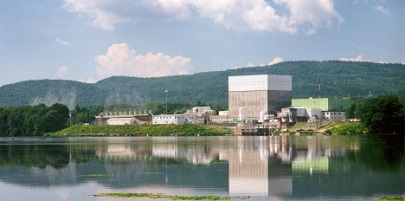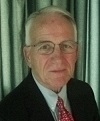Vermont Yankee: The Art of the Deal
 The Art of the Deal is the title of a book by Donald Trump, and it certainly applies to a recent press conference in Vermont. The press conference, on December 23, 2013, was about the eventual closing down of the Vermont Yankee power plant and was a big deal, a game changer, and a just-in-time Christmas present for many.
The Art of the Deal is the title of a book by Donald Trump, and it certainly applies to a recent press conference in Vermont. The press conference, on December 23, 2013, was about the eventual closing down of the Vermont Yankee power plant and was a big deal, a game changer, and a just-in-time Christmas present for many.
At the press conference, Peter Shumlin, who is the governor of Vermont, and Entergy Corporation announced an agreement for moving ahead on a final year of operation for Vermont Yankee and then its subsequent decommissioning (Entergy had last year announced the plant's scheduled closure, mainly for economic reasons). The agreement also reached closure on some federal lawsuits regarding the plant. What caught most people by surprise, though, was the "arms linked harmony" display that was featured by the state and Entergy at the press conference, after years of acrimony during which the governor and plant opponents stated that Entergy couldn't be trusted. The agreement was met with skepticism from the press, while the anti-nukes continue to say that they can't believe anything that Entergy has to say.
The negotiators
At the December press conference were the governor and Vermont's attorney general, the commissioner of the Public Service Department, the commissioner of the Department of Health, and the secretary of the Agency of Natural Resources. Representing Entergy and Entergy Nuclear Vermont Yankee were Mike Twomey and Jim Sinclair. Not explained at the press conference were the actual negotiations done to reach the agreement, but from the remarks of those making the announcement, they were all deeply involved with the agreement and of course concurred with it.
Everyone's tone was cordial, deferential, and mutually supportive. This was a huge change from the years during which the governor and the state officials were castigating Entergy and Vermont Yankee. For example, the governor had formerly routinely referred to the company as "Entergy Louisiana" in an effort to portray that it was not "one of us Vermonters with our values." However, he has more recently made it clear that he, along with the antis, were not criticizing the hard-working plant employees who were, and are, doing their jobs well.
What they said
The Settlement Agreement (13 pages, 33 items) identifies some remaining items still in disagreement, which will be moot if the planned Certificate of Public Good (CPG) for plant operation through 2014 is granted. However, most importantly, the agreement states that Entergy and the state find it in the public good for the plant to operate through the end of 2014, and that the state will support Entergy's request for a CPG before the Public Service Board (PSB). The parties are committed in writing to working in good faith, and having a "transparent and constructive" process.
Major specifics are:
- five federal suits or petitions from both sides will be dropped
- a site restoration fund up to $60 million
- an economic development fund of $10 million
- payment of taxes and release of escrow
- each party to be responsible for its own legal fees
- the discharge permit process for the Connecticut River will continue
- the state has the right of first refusal in buying the land
- a site assessment study will be completed by the end of the year, to include:
- evaluation of the immediate decommissioning option (DECON) as well as SAFSTOR
- site restoration to "greenfield" after release by the Nuclear Regulatory Commission
- steps for spent (used) fuel removal to dry storage and fuel pool closure
- state review of the site assessment study before submission of the post shutdown decommissioning activities report to the NRC and inclusion of the state's comments.
What the opponents are saying
The opponents continue on their chosen track. They continue to find fault with the agreement, accusing Entergy of acting in bad faith or being untruthful, cherry picking facts, and doing everything they can to give Vermont Yankee in particular and nuclear power in general a black eye. In other words, they run a no-holds-barred dirty political campaign.
Ray Shadis, now technical consultant to the anti-nuclear New England Coalition, complained that the agreement between the state and Entergy was a deal made by a few people behind closed doors (but actually there will be an extensive process of review in the form of the PSB). Further, Shadis complained about the time and money that the coalition had invested in its process to immediately close Vermont Yankee.
But why? The coalition is getting what it wanted, which is to shut down the plant. The only remaining piece is for the state and Entergy to agree with each other before the PSB. This PSB process is not bypassed.
Shadis further complained that Entergy's leading lawyer asked for a time extension last fall to present the agreement to the PSB, because he was involved in other cases. Shadis maintains that this was a stalling tactic, so that Entergy and the state would have more time to work out the agreement. But, how would Shadis know who was negotiating the deal, since he himself said that negotiations were conducted behind closed doors? Shadis wants to claim the victory of Vermont Yankee's shutdown for himself, as he does for Maine Yankee's shutdown.
Another anti-nuclear group, the Connecticut River Watershed Council, complains that the deal lets the plant off the hook since the updated discharge permit is still in process. The group wants the plant to use its cooling towers more and to stop "superheating the river."
On January 14, the PSB held an interactive state-wide hearing. Many of "the usual suspects" showed up to vent their feelings. One commenter said that granting the CPG to Vermont Yankee would be like giving a drunk a driver's license.
But state representative Tony Klein, chair of the state's Natural Resources and Energy Committee and a leading opponent of the plant, said that the deal struck by the state and Entergy is a pretty good one.
What it means
When Entergy last August announced the plan to close the plant at the end of 2014, the state and the opponents got what they had been howling about for years. But suddenly the ground under the governor had shifted, because while he had reached the objective that he ran his election campaign on, he wouldn't be able to claim that he did it. Also, decommissioning is under NRC jurisdiction, and so the state has no way of controlling it. SAFSTOR, which allows decommissioning to finish in 60 years, is in writing in the plant's sale agreement (from when Entergy purchased the plant years ago), so Shumlin's hands are tied in that area. There is a written agreement to restore the site to "greenfield" after the NRC regulates radiological decommissioning, but the term is not further defined.
Also, suddenly the governor is facing the situation that what Entergy had been saying about the adverse economic impact of plant closure might be true. Since the Vermont legislature's own economic study confirmed the negative impact, an economic downturn for the region seems pretty probable.
Also, Entergy was involved in several lawsuits and petitions, as well as commitments to the state. Up until now, the state had been siding with the opponents in opposing the plant before the NRC and the PSB. This had made things hard for Entergy, since the first tactic that lawyers learn is delay. The interveners in NRC procedures have been doing this nationally to the point where the NRC had to adopt a rule stating that if a license renewal is applied for five years before expiration, yet the proceedings continue beyond that period, the plant may continue to operate while the licensing continues. Vermont Yankee applied for license renewal more than five years before expiration (and the Seabrook plant, in New Hampshire, has applied 20 years before!). If Vermont continued to side with the opponents, Entergy faced agonizing and costly delays for many more years. This prospect needed to be prevented, if possible.
It appears that both the state and Entergy needed a way out of the legal and regulatory tangle created with the "help" of the opponents. It also appears that the state and Entergy recognized the political and financial realities, and that they got together for their own mutual benefit. This qualifies as a very "artful deal."
Where does this leave the opponents? Mostly out in the cold. With the state no longer on their side, they have little leverage. They know this, as can be seen from the increased anger of their rhetoric.
Where does this leave the PSB? With an easier task than before. The PSB had completed its hearings, testimony, and filings on the 20-year license renewal, and a decision was pending with no date set. The PSB faced the prospect of court appeals from the losing side. Now, with the state and Entergy together-and the operation time of nine months after the agreement's date set for a CPG, and the federal appeals court having upheld Entergy on nuclear preemption, and the plant's superior record-it will be hard to find something that will not be in the public good. It is expected that the PSB will complete the hearings to give the opponents their "day in court," and perhaps impose a few administrative conditions, and then approve the CPG.
The opponents can be expected to continue to fight to the end, and to try to make it even more bitter.

________________________

Shaffer
Howard Shaffer has been an ANS member for 35 years. He has contributed to ASME and ANS Standards committees, ANS committees, national meeting staffs, his local section, and was the 2001 ANS Congressional Fellow. He is a former member of the ANS Public Information Committee, consults in nuclear public outreach, and is coordinator of the Vermont Grassroots Project.
Shaffer holds a BSEE from Duke University and an MSNE from MIT. He is a regular contributor to the ANS Nuclear Cafe.








